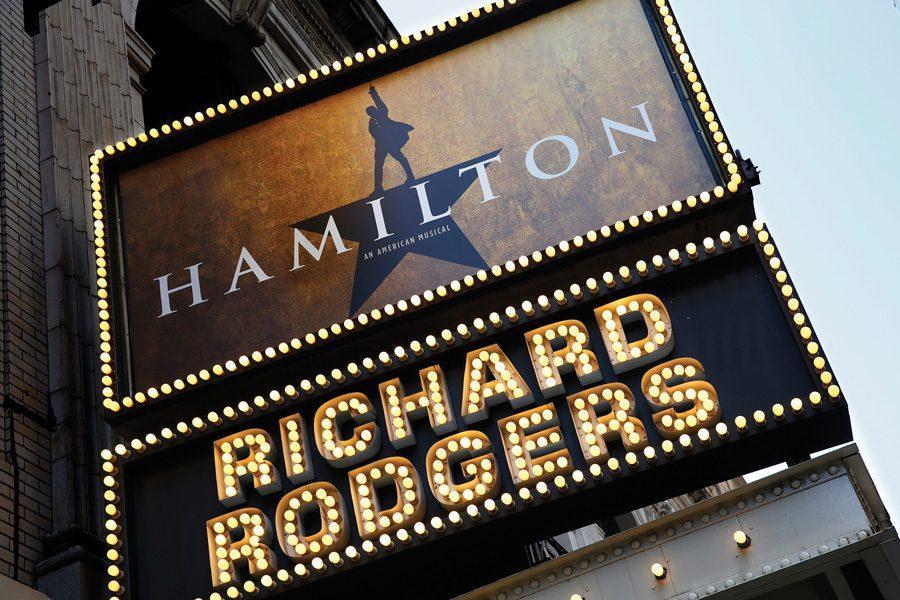Northwestern music alumnus part of ‘Hamilton’ success since the start
Source: Carolyn Cole/Los Angeles Times
The new Broadway show “Hamilton” in previews at the Richard Rodgers Theatre in New York City.
March 1, 2017
When Stephen Colbert asked the crowd during the 2016 Kennedy Center Honors if “anyone (can) get me tickets to ‘Hamilton,’” crew member Ian Weinberger said he truly realized he was part of a Broadway hit.
“It still kind of honestly surprises me,” he said. “People tell me about their 7-year-old granddaughter who knows every word, and I’m like, really?”
Weinberger (Bienen ’09) is currently the associate music conductor for the musical “Hamilton” in New York. He first joined the show two years ago as a rehearsal pianist, just two weeks after its opening, and from there worked his way up the ranks to his current position.
Before the “Hamilton” craze, he had been working on Broadway for “Kinky Boots” and “The Book of Mormon” for nearly three years. Before that, he was a participant in Waa-Mu shows at Northwestern.
Theater Prof. emeritus Dominic Missimi, who worked with Weinberger while directing several Waa-Mu shows, said he was amazed by the interactions Weinberger, who was a percussionist, had with other actors the first time he met him.
“I went up and introduced myself and said, ‘You’re really good. You’re not just a great drummer, but you’re also a wonderful performer,’” Missimi said. “He said, ‘Oh no, I’m not a performer. I’m just enjoying my work.’”
Missimi described Weinberger as a “jack of all trades” because of his ability to play the piano and percussion, as well as conduct and direct.
For a year, Weinberger juggled playing the keyboard and conducting for “Hamilton,” “Kinky Boots” and “The Book of Mormon” and said it was the hardest he had ever worked in his life.
Theater Prof. Ryan Nelson said Weinberger was only able to manage working for three musicals at the same time due to his ability to work well with other people. Weinberger is an expert at collaborating and communicating with professionals, which is an essential trait to his job, Nelson said.
As much as he loved all the shows he worked on, Weinberger eventually decided to work full time for “Hamilton.” Stepping into the rehearsal rooms, he said he knew it would be an extraordinary show.
“I remember my first couple days down there and walking around meeting everybody and the energy was definitely electric,” he said. “They really knew they had something special.”
Yet, nobody expected the massive cultural impact it has today, he said. It was only after the release of the album, seven months after its opening, that it began “spreading like wildfire.”
The show then started showing up in the money — not just arts — section of The New York Times. Songs were referenced in magazines and pop culture, and tickets became impossible to get. It was then when Weinberger realized that “Hamilton” was getting much bigger than what anyone had anticipated, he said.
Weinberger said it is this rush of excitement surrounding the show that energizes him before every gig.
“It’s always pretty exciting when the show starts because most people are seeing it for the first time,” he said. “Most of them have had these tickets for a very long time and went through a lot to get them.”
He added that he also finds the musical challenges of the show enjoyable. Most musicals have scenes between each song for the orchestra to take a break, but in “Hamilton,” the music never stops. It’s a “mental game” where everyone needs to be in their zone for a whole three hour chunk, he said.
Weinberger attributed the success of “Hamilton” to its relatability. The show struck a nerve with younger generations because they “felt like they belonged,” as the musical is narrated in hip-hop, a language that modern young audiences understand.
The musical also skyrocketed because it happened at precisely the right time politically, he said. At the time of its rising fame, the end of President Barack Obama’s term was nearing and race relations had flared up again, Weinberger said.
“This is a very pressing time to be talking about issues of racial equality, economic equality, the role of immigrants in shaping our nation and the role of America in the larger world,” he said.
Weinberger said the show’s relevancy can be seen in the way the tone of the show has changed over the course of the election, most recently since Trump’s immigration ban.
“No matter who you are or what kind of background you come from, any person can have a tremendous influence on our country and our society, and any person should be able to have that (opportunity) if they seek it out,” Weinberger said.
Weinberger said the issues discussed in “Hamilton” will continue to be important, which is why the show will continue to stand and provoke discussion.
He plans to stay with the show for a long time, which he said is unusual for those in theater who are used to jumping from one short-term production to the other.
“I’m very lucky and it is unusual that when I took over the job six months ago, I knew I was walking into something that was going to be there for a long time,” Weinberger said.
Email: catherinekim2020@u.northwestern.edu
Twitter: @ck_525



